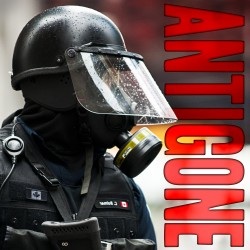Ancient play set in modern-day Toronto leaves room to debate what happened at the G20 Summit protests
By Mickal Aranha
It’s been two years since the G20 Summit in Toronto, cause for Canada’s biggest security operation and the largest mass arrest in peacetime history, and almost a year since the Occupy Toronto movement began.
Many believe the response to the G20 Summit was the most massive compromise of civil liberties in Canadian history. Though a mish mash of disparate reports, reviews and inquiries investigating how the protests were handled by authorities have been released, we, as a city, are hungry for a sense of resolution.
Set in Toronto during the G20 protests, Soup Can Theatre’s adaptation of Sophocles’ Antigone has drawn a lot of attention since its July 4 premiere at the Toronto Fringe Festival. The theatre company is behind the hit Love is a Poverty You Can Sell and the critically acclaimed Marat/Sade.
Soup Can Theatre’s version of Antigone is ambitious, and while the production does have its flaws, it’s well executed overall. It adds much-needed creative input to the discourse surrounding the G20 and Occupy protests.
The play begins with the familiar incendiary images of authorities armed with gas masks and batons and the deafening noise of chaos. The Theban war has ended and two sisters, Antigone and Ismene are being cornered as they discuss what to do with their brothers’ remains. The two brothers, Eteocles and Polyneices, have died fighting on opposite sides. Creon, the new ruler of Thebes has decided that Eteocles will be honoured with a hero’s burial, while the body of Polyneices, the rebel, will be left on the battlefield to rot.
Antigone bravely decides to bury and honour both brothers without help from her sister. Ismene is afraid of what Creon will do to punish such a blatant defiance. Indeed, when Creon learns of Antigone’s transgression from a messenger, he decides to make an example out of her, despite the protests of his son Haemon to whom she is engaged. Antigone’s noble act ultimately leads to tragic consequences for all those involved.
The depictions of security forces with gas masks and batons in the play echo the images of the G20 and Occupy protests published widely by newspapers. But other than that, I initially thought other comparisons between the Greek tragedy and the Toronto protests were a bit of a stretch. I didn’t see how the production strayed much from a classical interpretation of the play.
However, my opinion shifted after asking Scott Dermody, who conceived and directed the play, how he made the connection.
“I would love to say that I immediately saw parallels between Antigone and the events of the Toronto G20 as they happened, but a much simpler event triggered the connection in my mind.”
Dermody made the connection after reading a news sidebar about the experience of two brothers during the G20 protests. One was a protestor and the other was a police officer. The article looked at how they came to terms with personal division in the city after the summit.
“I picked up Antigone for another reading and began noticing a whole host of blatant modern-day parallels to the ancient script,” he said.
The text addresses basic issue of power, politics and personal responsibility that carry into present day. And in some ways, Dermody believes the discussions of these topics in Antigone are far more even-handed than the discourse today.
“Far too often these days, we hear polemic after polemic and are forced into a left-wing, right-wing state of mind. Sophocles has an opinion – as do I for that matter – but allows his characters to debate the relative merits of each side. I think that is part of what was missing during the G20 Summit here in Toronto. Antigone helps fill in the gaps even now.”
Antigone had a number of standout performances. Cydney Penner as Antigone, Thomas Gough as Creon and Chloe Payne as the messenger were excellent, managing to create powerful moments in the play. There are a few other good performances, however a couple members of the chorus were unconvincing.
Soup Can Theatre’s project is an admirable creative endeavour and the sort of project that will get people thinking about political issues. Dermody’s view on the role of the arts in political discourse seems in line with what they have achieved with this play. He believes in theatre’s role as an engaging forum for debate.
“Creative portrayals of events like the G20 remind us that we cannot live in self-contained isolation,” he said. “Somewhat ironically, Soup Can Theatre’s production of an ancient script happened to bring much of the subtext of modern Canadian political discourse into the foreground, albeit with the stakes raised considerably.”
The risk Dermody and his cast have taken in bringing a unique adaptation of Antigone to life is paying off – audience feedback has so far been outstanding. The story is striking a chord.

